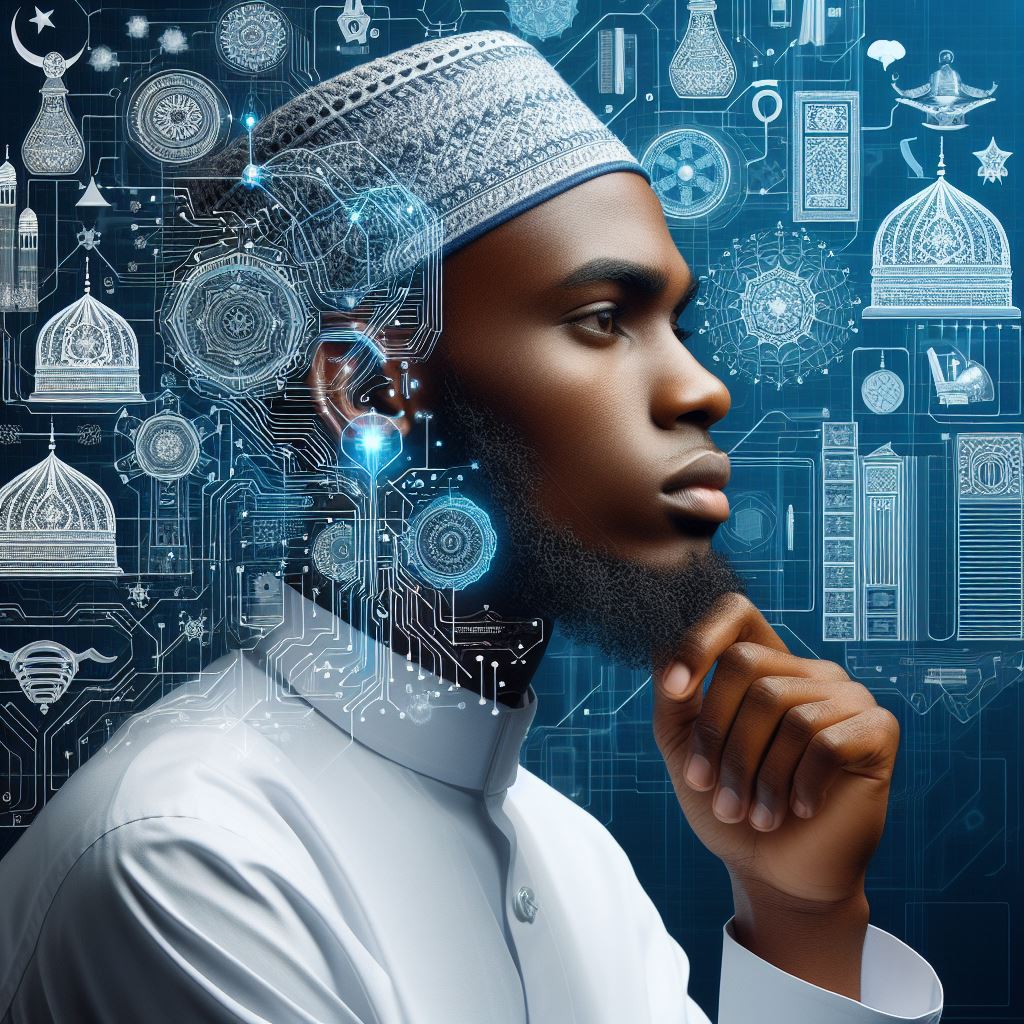Introduction
Technological innovations refer to new technologies that enhance processes, efficiency, and outcomes. In education, technology plays a crucial role by improving access, engagement, and learning experiences.
Importance of Technology in Education
- Enhances accessibility for diverse learners
- Facilitates interactive and engaging learning methods
- Supports the integration of multimedia resources
- Enables remote and flexible learning options
Focus on Technological Innovations in Islamic Studies
This blog post explores how technological innovations revolutionize Islamic studies. We will examine digital tools, online resources, and innovative teaching methods transforming the field.
Technology empowers educators and students, making Islamic studies more accessible and engaging.
Traditional Methods of Studying Islamic Texts
Traditional methods of studying Islamic texts involved manual transcription, memorization, and oral transmission.
Students would sit with a teacher, known as a sheikh, and recite the Quran or Hadith.
This method ensured the preservation of the sacred texts and oral traditions of Islam.
The handwritten manuscripts were painstakingly copied by scribes to disseminate knowledge.
Historical Use of Technology in Islamic Education
The historical use of technology in Islamic education can be traced back to the Middle Ages.
Islamic scholars developed tools such as astrolabes, water clocks, and other scientific instruments.
These tools were used to study astronomy, mathematics, and other subjects in Islamic education.
These technological advancements played a crucial role in the Islamic Golden Age.
Evolution of Technological Innovations in Islamic Studies
In the modern era, technological innovations have revolutionized the field of Islamic studies.
The internet has provided access to a wealth of Islamic texts, lectures, and resources.
Online platforms like Bayyinah Institute, Islamic Online University, and others offer courses in Islamic studies.
E-books, mobile apps, and social media have made learning about Islam more accessible to a global audience.
Moreover, the advent of virtual reality and augmented reality technologies are being utilized in Islamic education.
Virtual tours of historical Islamic sites, interactive learning experiences, and digital libraries are becoming more prevalent.
These innovations enhance the learning experience and make studying Islamic texts more engaging.
Overall, technology has significantly transformed the way Islamic studies are taught and learned.
Read: Day in the Life of a Nigerian Beauty Therapist
Impact of Technology on Islamic Education
Revolutionizing Islamic Studies with Technology
Technology has revolutionized Islamic studies by transforming traditional teaching methods. Digital tools and online platforms have modernized the learning experience, making it more interactive and dynamic.
Teachers now use multimedia presentations to explain complex religious concepts. This approach engages students better than traditional lectures.
Benefits of Technology in Learning Quran, Hadith, and Other Religious Texts
Technology offers numerous benefits for learning the Quran, Hadith, and other religious texts. Some key advantages include:
- Interactive Learning: Apps and websites provide interactive lessons, quizzes, and games. These tools make learning more enjoyable and effective.
- Access to Resources: Online libraries and databases offer vast collections of religious texts. Students can access these resources anytime, anywhere.
- Personalized Learning: Educational software adapts to individual learning styles. This personalization helps students progress at their own pace.
- Audio and Visual Aids: Videos, audio recordings, and animations help explain difficult concepts. These aids enhance understanding and retention.
- Collaborative Learning: Online forums and study groups facilitate discussion and collaboration. Students can learn from peers worldwide.
Making Islamic Education More Accessible and Engaging
Technology has significantly increased accessibility to Islamic education. Here’s how:
- Online Courses and Tutorials: Numerous websites offer free or affordable courses. These courses cover various aspects of Islamic studies.
- E-Books and Digital Libraries: Digital libraries provide access to thousands of books. Students can easily find and read texts on their devices.
- Mobile Apps: Educational apps make learning portable. Students can study on the go using their smartphones or tablets.
- Virtual Classrooms: Video conferencing tools enable real-time interaction with teachers. Virtual classrooms make education accessible to remote students.
- Social Media Platforms: Platforms like YouTube and Facebook host lectures and discussions. These platforms help spread knowledge to a broader audience.
Enhancing Engagement Through Technology
Technology has made Islamic education more engaging. Here are some ways it achieves this:
- Gamification: Learning apps use game-like elements to motivate students. Points, badges, and leaderboards make learning competitive and fun.
- Interactive Quizzes: Quizzes test knowledge and provide immediate feedback. This interactivity keeps students engaged and helps them learn from mistakes.
- Virtual Reality (VR): VR creates immersive learning experiences. Students can explore historical sites and events related to Islamic history.
- Augmented Reality (AR): AR apps overlay digital information on the real world. This technology makes learning more interactive and visually appealing.
- Live Streaming: Live streaming of lectures and events reaches a global audience. Students can participate in real-time from anywhere.
Technology has profoundly impacted Islamic education, making it more accessible, engaging, and effective.
By leveraging digital tools, educators can enhance the learning experience, ensuring that students gain a deeper understanding of their faith. The integration of technology in Islamic studies promises a brighter, more connected future for learners worldwide.
Read: Cosmetology and Beauty Therapy Scholarships in Nigeria
Examples of Technological Innovations in Islamic Studies
When it comes to teaching Islamic subjects, educators are leveraging a variety of tools and technologies to enhance the learning experience for students. The integration of technology has opened up new possibilities and made learning more interactive and engaging.
Specific Tools and Technologies Used
- Smartboards: These interactive whiteboards allow teachers to display and manipulate digital content, making it easier to explain complex concepts.
- Online Learning Platforms: Websites like Khan Academy and Coursera offer courses on Islamic subjects, providing students with access to quality educational resources.
- Mobile Apps: Applications like Quran Companion and Muslim Pro provide users with tools for learning and practicing Islamic teachings on-the-go.
- Islamic Software: Programs like Sunnah.com and Alim.org give students access to authentic Islamic texts and resources for study and research.
Online Platforms, Apps, and Software
Technology has made it easier for students to access Islamic texts and resources online, enabling them to study and research in a more efficient and convenient manner. Here are some examples:
- QuranExplorer.com: This website allows users to read, listen to, and study the Quran in multiple languages, with various tools for interpretation and analysis.
- Hadith of the Day App: This mobile application provides users with a daily hadith for reflection and learning, helping to strengthen their understanding of Islamic teachings.
- Bayyinah TV: An online platform offering courses on Arabic language and Quranic studies, allowing students to learn from renowned scholars in the field.
- Zekr Software: A comprehensive Quranic study tool that includes recitations, translations, and tafsir, helping students engage with the Quran more deeply.
Virtual Reality, Augmented Reality, and Multimedia
Advancements in virtual reality, augmented reality, and multimedia have revolutionized the way Islamic education is delivered, providing immersive and interactive experiences for students. Here’s how these technologies are being used:
- Virtual Reality: Platforms like Virtue Reality offer virtual tours of historical Islamic sites, giving students a firsthand experience of these significant landmarks.
- Augmented Reality: Apps like Salaam AR use AR technology to superimpose digital content onto the real world, creating interactive learning experiences for students.
- Multimedia Presentations: Teachers are incorporating videos, animations, and audio clips into their lessons to make learning more visually engaging and stimulating for students.
- Interactive Maps: Tools like Islamic Maps provide interactive maps showcasing historical Islamic empires, helping students visualize geographical contexts in their studies.
In short, technological innovations have significantly transformed the landscape of Islamic studies, offering students a wealth of resources and interactive learning opportunities.
By integrating these tools and technologies into education, educators are able to create engaging and enriching experiences for students, fostering a deeper understanding and appreciation of Islamic teachings.
Read: How to Open a Beauty Salon in Nigeria: Step-by-Step

Challenges and Considerations
Technology has the potential to revolutionize the way Islamic studies are taught and accessed. However, the integration of technology into this field is not without its challenges and considerations.
Potential Challenges in Integrating Technology into Islamic Studies
- Lack of access to technology in certain regions may hinder widespread adoption.
- Resistance to change from traditionalists who prefer conventional teaching methods.
- Ensuring the accuracy and reliability of online resources and platforms.
Addressing these challenges requires a thoughtful approach that balances tradition with innovation. It is essential to navigate the following concerns to ensure the quality of Islamic education in a digital landscape.
Concerns Related to Authenticity, Reliability, and Interpretation
- Questions about the authenticity of religious texts when accessed digitally.
- Risks of misinterpretation or distortion of religious teachings through digital platforms.
- Challenges in verifying the credibility and accuracy of online Islamic resources.
These concerns highlight the importance of establishing guidelines and best practices for creating and disseminating digital content in Islamic studies. It is crucial to ensure that the information presented is accurate, reliable, and in line with authentic Islamic teachings.
Ways to Overcome Obstacles and Ensure Integrity of Islamic Education
- Provide training and resources to educators to effectively utilize technology in teaching.
- Establish quality assurance mechanisms to verify the accuracy and authenticity of digital content.
- Encourage collaboration between technology experts and Islamic scholars to develop reliable digital resources.
By overcoming these obstacles and addressing the concerns related to authenticity, reliability, and interpretation, it is possible to enhance the quality and accessibility of Islamic education in the digital age.
Embracing technology while upholding the values and traditions of Islamic studies is key to ensuring the integrity of this field in a rapidly evolving digital landscape.
Read: Cultural Exchange Between Nigeria and China
Future trends in technological innovations in Islamic studies
As technology continues to advance at a rapid pace, there are several upcoming technologies that could further enhance Islamic education.
These advancements have the potential to transform the way Islamic studies are taught and learned, making education more accessible and engaging for students around the world.
Virtual Reality (VR) and Augmented Reality (AR)
One of the most promising technologies for the future of Islamic studies is virtual reality and augmented reality.
These immersive technologies can provide students with interactive experiences, allowing them to explore historical sites, artifacts, and texts in a more engaging and dynamic way.
For example, students could virtually visit important Islamic landmarks like the Kaaba in Mecca or the Alhambra in Spain, gaining a deeper understanding of their cultural and historical significance.
Artificial Intelligence (AI)
Artificial intelligence has the potential to revolutionize Islamic education by personalizing learning experiences for each student. AI-powered educational platforms can analyze students’ strengths and weaknesses, adapting the curriculum to their individual needs.
This technology can also assist teachers in creating customized lesson plans and providing real-time feedback to help students improve their understanding of complex concepts.
Online Learning Platforms
With the increasing popularity of online education, there is a growing demand for high-quality Islamic studies courses and resources. Future advancements in online learning platforms could include interactive modules, live virtual classes, and peer-to-peer collaboration tools.
These platforms can connect students from diverse backgrounds and geographical locations, promoting a global exchange of ideas and perspectives within the field of Islamic studies.
Blockchain Technology
Blockchain technology has the potential to revolutionize the way academic credentials are verified and authenticated in the field of Islamic studies.
By securely storing educational records on a decentralized ledger, students can easily access and share their certificates and diplomas with potential employers or academic institutions.
This technology can also ensure the integrity and transparency of academic achievements, reducing the risk of fraud and misrepresentation.
Gamification
Gamification is a technique that uses game design elements in non-game contexts to motivate and engage users. In the context of Islamic studies, gamification can make learning more enjoyable and interactive, encouraging students to actively participate in lessons and assessments.
By incorporating elements like points, badges, and leaderboards, educators can create a fun and competitive learning environment that motivates students to strive for academic excellence.
Generally, the future of technological innovations in Islamic studies holds great promise for enhancing the quality and accessibility of education in this field.
Educators and students embrace virtual reality, artificial intelligence, online platforms, blockchain, and gamification.
They enjoy more engaging and interactive learning experiences. These technologies transcend geographical boundaries and cultural differences.
Conclusion
In closing, technological innovations have revolutionized the field of Islamic studies. These advancements have enabled access to vast amounts of information easily.
Through online platforms, students can engage with Islamic teachings and connect with scholars worldwide. The use of virtual reality and augmented reality provides immersive learning experiences.
Moreover, mobile applications have made learning on-the-go possible, allowing individuals to enhance their knowledge at their convenience.
The integration of artificial intelligence has streamlined research processes and facilitated in-depth analysis of Islamic texts. The digitization of manuscripts has preserved invaluable historical documents for future generations.
The significance of technological innovations in advancing Islamic education cannot be overstated. These tools have opened up new avenues for learning and research, breaking down traditional barriers.
They have fostered a global community of learners and scholars interested in Islamic studies.
As we look to the future, it is essential to encourage further exploration and adoption of technology in Islamic studies.
Embracing these innovations will not only enrich educational experiences but also help preserve and promote Islamic heritage in the modern world. By leveraging technology, we can ensure that Islamic knowledge remains accessible and relevant for generations to come.




